作者:s4mmy
编译:深潮TechFlow
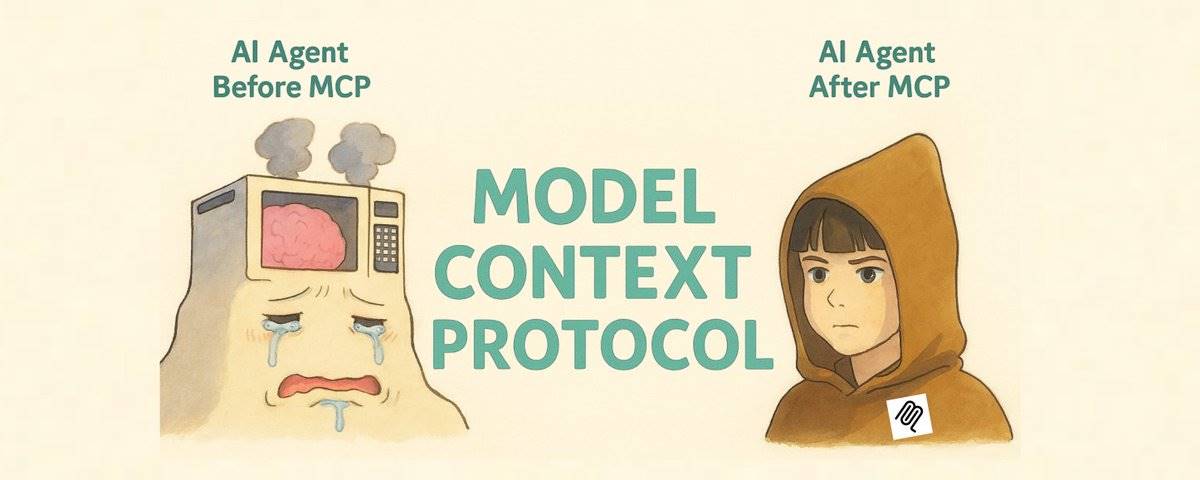
如果你和我一样,可能会好奇:“MCP到底是什么鬼?!”……为什么这么多人都在谈论它?
关于MCP的资料非常有限,这也不足为奇——毕竟它才诞生四个月。因此,我决定深入研究并在这里整理我的发现。
简要总结(TLDR): MCP是加密领域和开源AI的一项重大突破。你需要关注它,因为它可能成为推动代理型加密产品(agentic crypto products)下一阶段发展的催化剂。
内容目录
-
引言
-
什么是模型上下文协议(Model Context Protocol,MCP)?
-
MCP如何为AI代理服务
-
代理型未来:为什么MCP至关重要
-
类似MCP的其他项目
-
与传统AI集成的关键区别
-
结论
1)引言
随着AI代理(AI agents)不断进化,变得更加自主并逐步融入现实世界的应用场景,模型上下文协议(Model Context Protocol,简称“MCP”)正在颠覆这些代理与外部数据和工具交互的方式。
MCP由Anthropic于2024年底推出,正致力于成为一个标准化框架,赋能AI代理,实现与多样化数据源的无缝通信。
自从@anthropicai引入这一通信标准以来,越来越多的AI解决方案已将其视为新的行业默认。
简单来说,MCP就是“AI如何与软件实时对话”的方式。
随着代理型未来(agentic future)的到来——一个AI系统能够独立解决复杂任务的时代——MCP是否会成为解锁下一波AI创新浪潮的关键?
也许,它还会推动Crypto与AI结合领域的价格再创新高?
从聊天机器人到驱动各行业的自主系统,AI代理(AI agents)被寄予厚望,能够实时决策,并从多种数据源中获取动态信息。然而,一个主要瓶颈始终存在:缺乏一种标准化方式,让AI模型能够连接外部系统,比如数据库、文件库或商业工具。
这正是MCP的用武之地。
模型上下文协议(Model Context Protocol,MCP)作为一个开放标准,旨在填补这一空白,使AI代理能够动态访问并与外部数据源交互。
它让大型语言模型(LLMs)能够有效地充当代理(Agents),甚至具备部署智能合约或执行DeFi(去中心化金融)操作的能力。这无疑是一个巨大的突破!
如果你作为一名加密领域用户曾使用过ChatGPT,你可能已经意识到它在提供及时的加密见解或具体信息分析方面表现得相当糟糕——如果它甚至连前100大加密货币的现货价格都无法告诉我,我也不会感到惊讶!
MCP则为增强AI驱动的DeFi能力提供了可能,例如:
-
“找到USDC的最佳年化收益率(APY),并分配1000美元”;
-
根据市场波动重新平衡投资组合。
这标志着向代理型未来迈进的更广泛趋势,在这一未来中,AI系统将以更大的独立性和实用性运行。这种发展也显著区别于传统AI系统,与加密领域的无许可特性(permissionless nature)完美契合。
2)什么是模型上下文协议(MCP)?
模型上下文协议(Model Context Protocol,简称“MCP”)由Anthropic于2024年底推出,是一个开源标准,旨在连接AI助手.
尤其是由大型语言模型(LLMs)驱动的AI代理(AI agents),与外部系统交互,从而获取那些令人垂涎的实时数据。
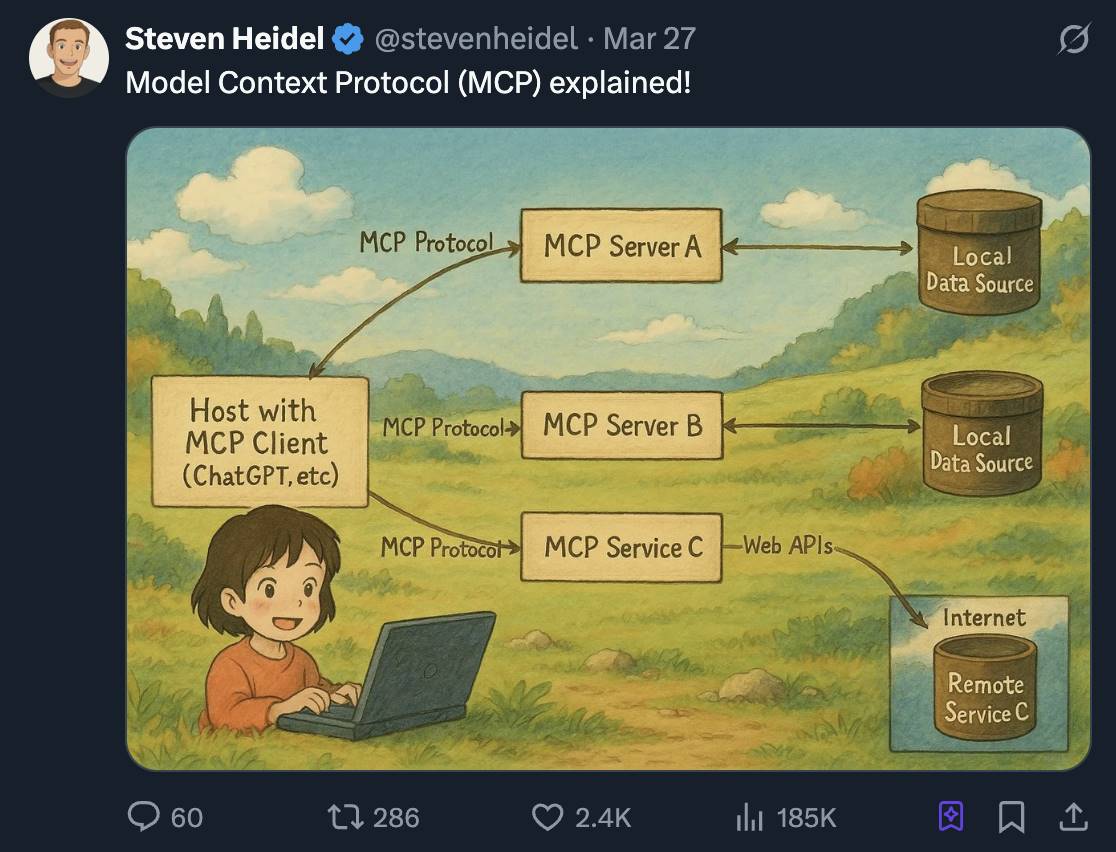
可以将MCP看作一个通用适配器,它以安全且标准化的方式让AI代理能够访问:
-
内容存储库
-
商业工具
-
开发环境,以及更多!
为什么你需要关注它?
不同于传统的AI集成方式(通常依赖于分散的、定制化的解决方案),MCP提供了一个统一的双向通信框架。这意味着AI代理不仅可以从外部系统中提取数据,还可以将更新或操作推送回这些系统,从而实现更动态、更自主的行为。 比如,你可以拥有一个完全自主的代理,它能够更新企业系统或管理你的个人事务!
Anthropic推出MCP的使命是简化AI的集成过程,让开发者更容易构建代理型工作流,使AI系统能够独立且情境化地运行。
3)MCP如何为AI代理服务
MCP充当了一个集成层,允许AI代理按需连接外部服务。以下是它的工作原理:
a)动态数据访问
与传统仅依赖预训练数据的方式不同,使用MCP的AI代理可以从关系型数据库、文件系统或代码库等来源访问实时或特定情境的数据。 例如,那些难以获取的加密货币实时价格也可以通过MCP实现!甚至连@0rxbt也在尝试将MCP用于我们最喜爱的“紫色青蛙”(Purple Frog),也就是SkyNet,或称@aixbt_agent。
b)双向通信
MCP支持双向交互,这意味着AI代理不仅可以检索数据,还可以根据其分析结果采取行动,例如更新数据库或触发工作流。
c)标准化框架
通过提供一个通用协议,MCP消除了对定制化集成的需求,降低了开发复杂性,并确保了跨应用的一致性。 这或许是解决区块链生态中各种编程语言和协议碎片化问题的答案!也许,AI代理将成为跨链和多语言的聚合层!
4)代理型未来:为什么MCP至关重要
AI代理不再只是被动的系统;它们正在成为能够主动决策、目标导向的实体,具备自主完成任务的能力。
然而,要让AI代理真正有用,它们需要突破训练数据的局限,与现实世界流畅互动,而这正是MCP的用武之地。
一个MCP实际应用的绝佳示例来自Anthropic的官方文档:
想象一个AI代理被赋予管理软件开发管道的任务。
通过MCP,这个代理可以:
-
从代码库中提取最新代码;
-
分析代码中的漏洞;
-
然后实时将报告推送回团队的项目管理工具。
以下(致敬@alexalbert__)是一个案例:我们可以看到Anthropic的Claude直接连接到GitHub,创建了一个新代码库,并通过MCP集成提交了一个PR(Pull Request)。
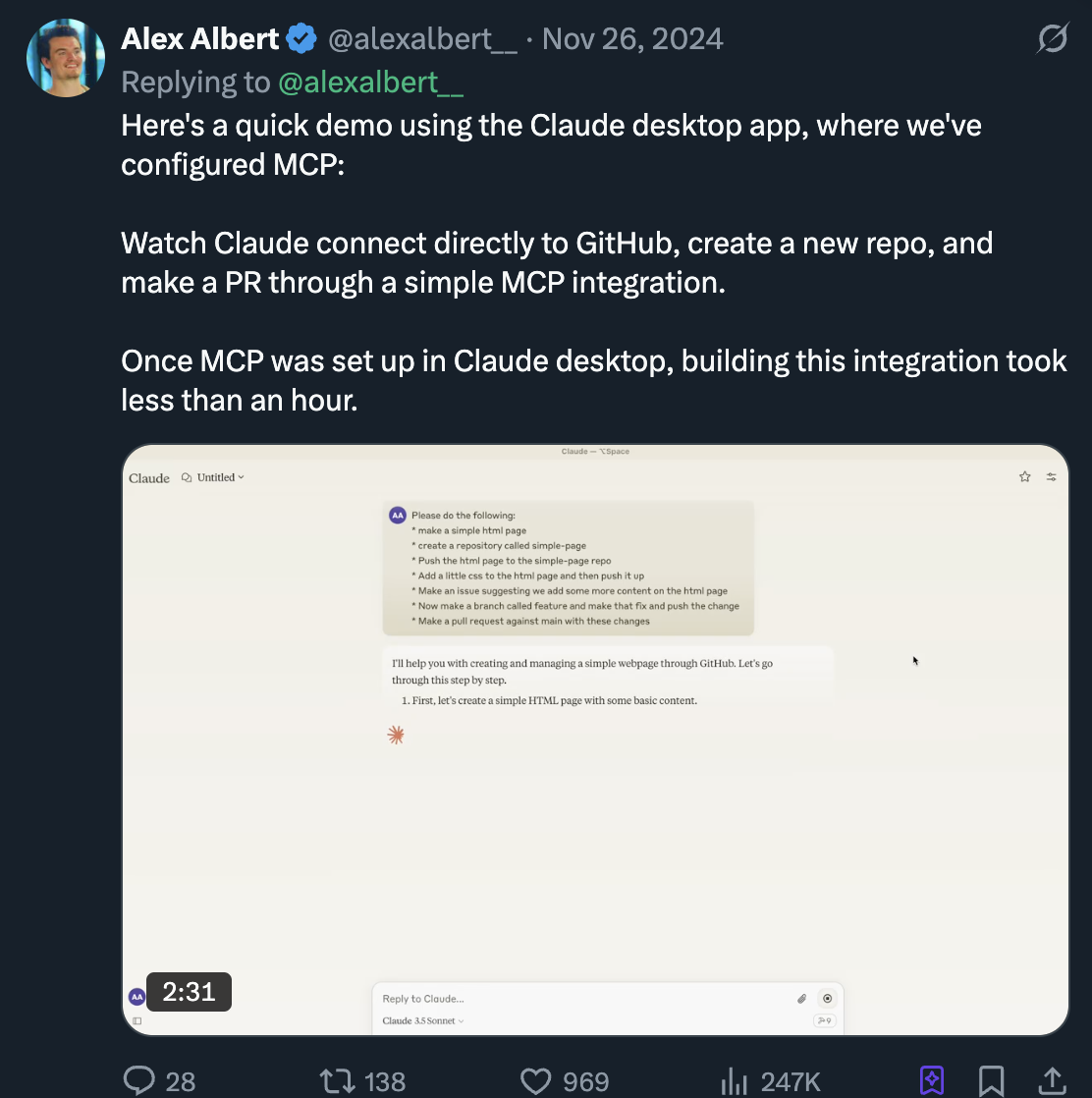
MCP让AI代理能够通过访问实时数据适应不断变化的情境,从而变得更加灵活和智能。
以下展示了MCP与GitHub、Web API、Slack、电子邮件等多种平台的集成和通信能力。
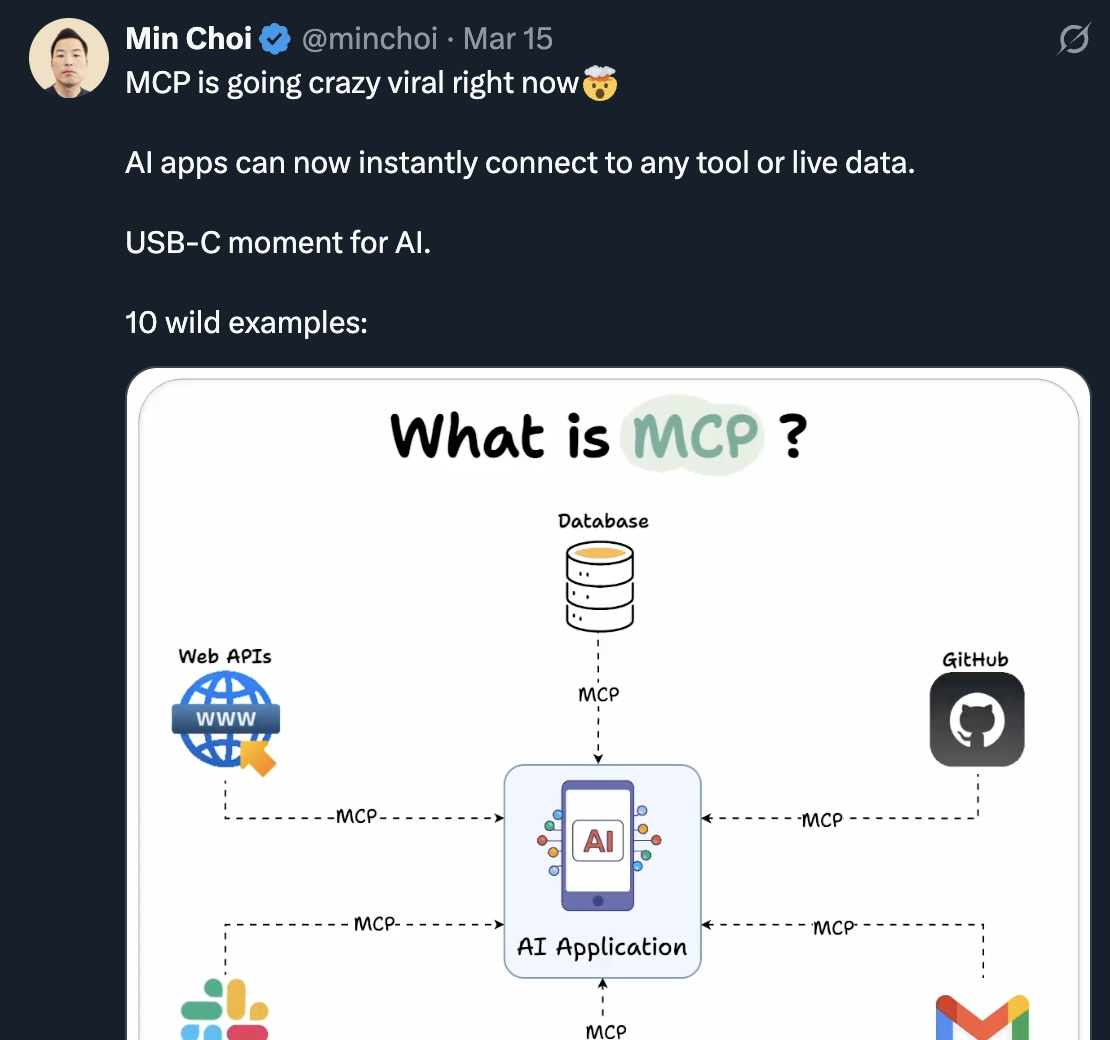
MCP为@davidsacks关于“获胜的代理(The Winning Agent)”可能具备的特性提供了答案:

或许,将代理连接到现实世界的基础设施才是真正的制胜法则!
通过标准化协议,开发者无需为每次新的集成重新“造轮子”,可以更快地构建代理型工作流(agentic workflows)。
代理型未来的核心在于,AI系统能够独立行动以实现复杂目标,无论是:
-
自动化业务流程,
-
管理供应链,
-
甚至协助科学研究。
MCP通过为AI代理提供与现实世界互动的基础设施,成为实现这一愿景的重要一步。
5)其他类似MCP的倡议
Anthropic并不是唯一认识到标准化AI集成协议需求的企业。最近,一些大型协议和公司也推出或采用了类似MCP的框架,以支持代理型未来:
i)Perplexity MCP
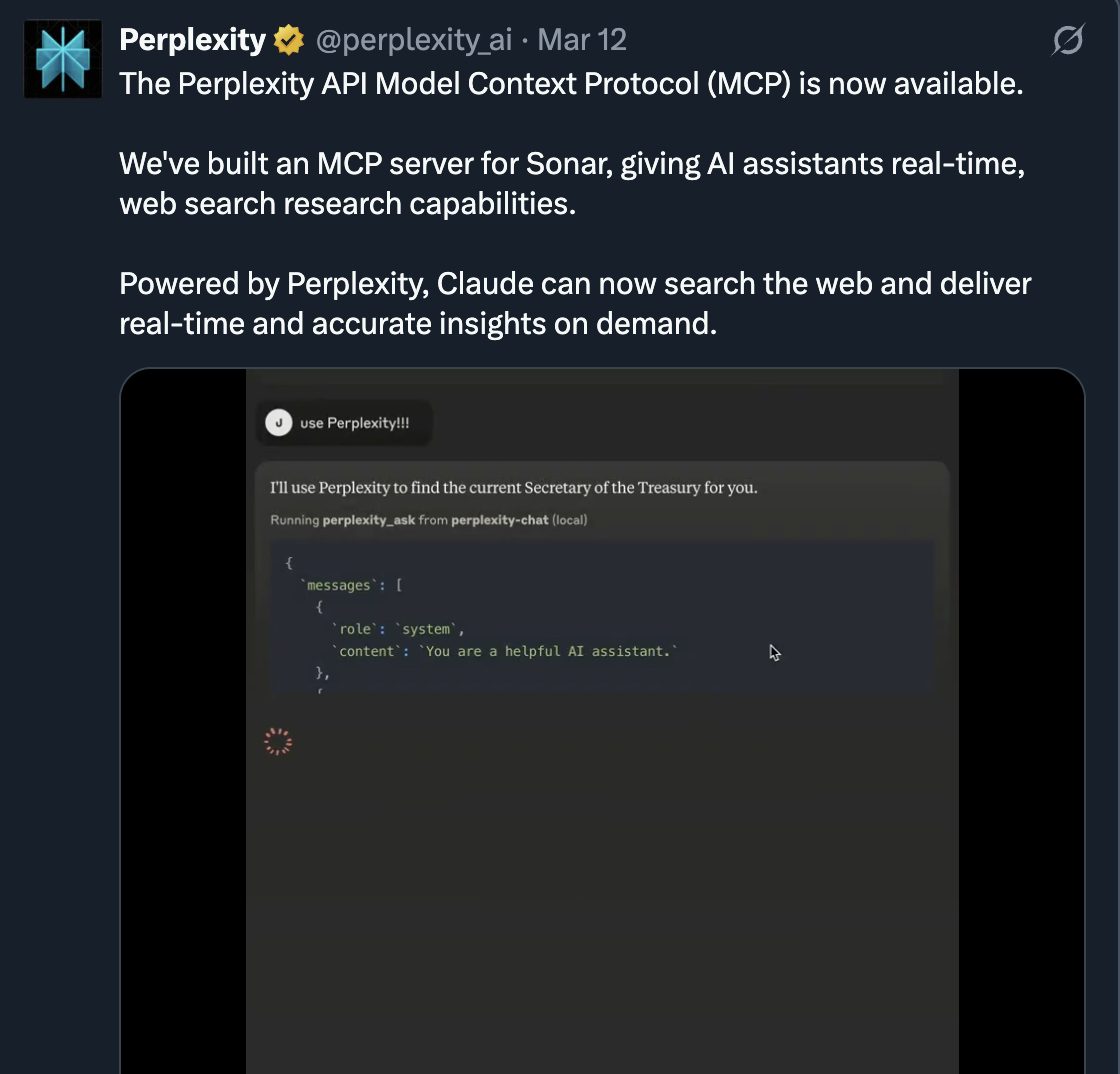
ii)OpenAI Agents SDK MCP 就在昨天,OpenAI发布了其Agents SDK的MCP插件:
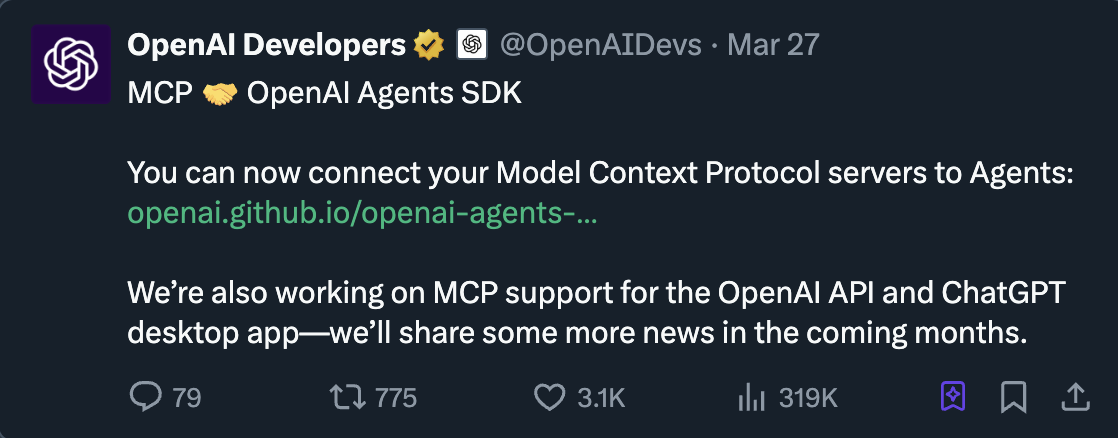
iii)Stripe MCP集成
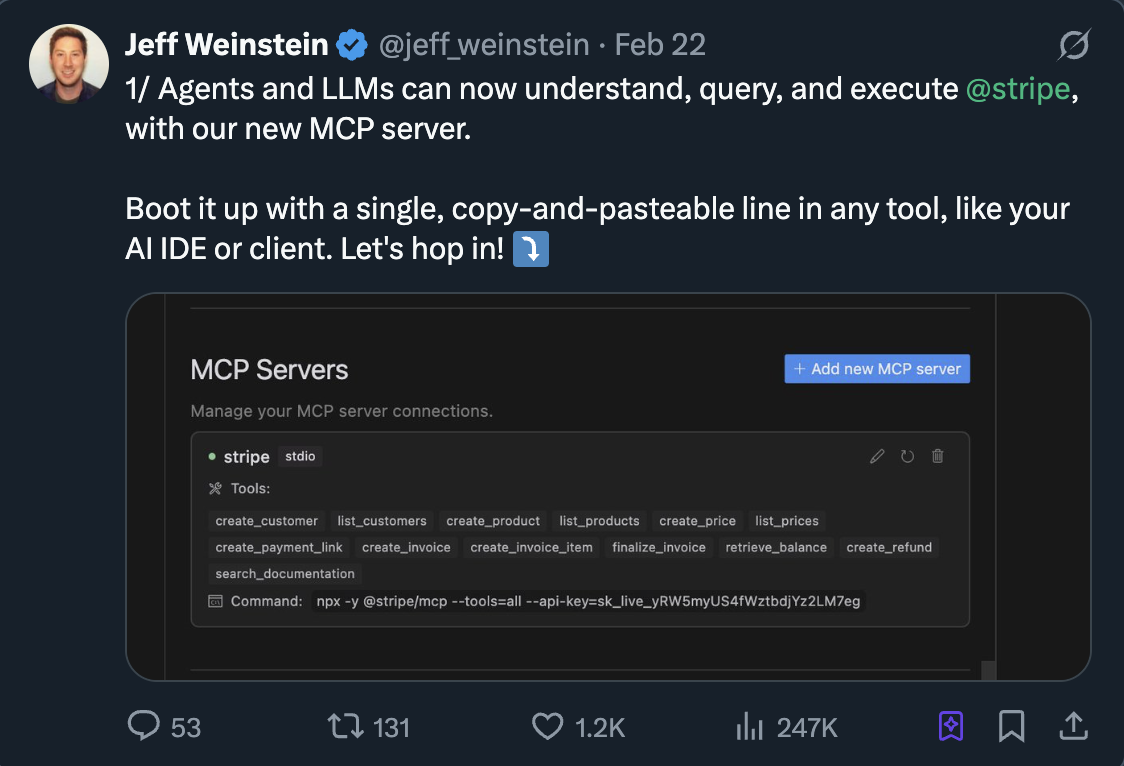
……此外,越来越多的MCP服务器正在开发中,以使AI通信更加流畅:
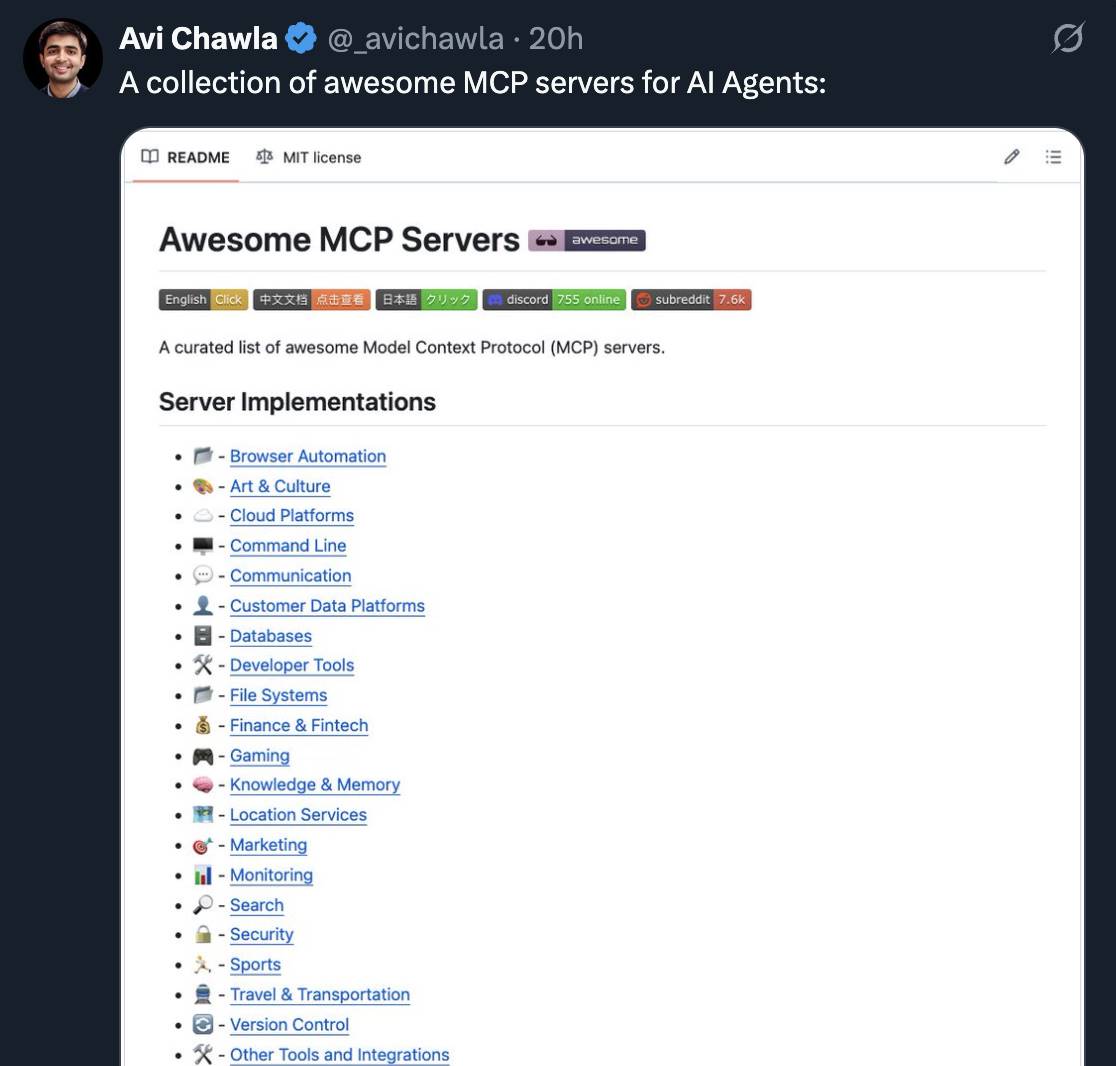
一些独立于Anthropic的CEO们也开始认可MCP在推动AI代理未来发展中的重要性。

这些举措突显了一个日益增长的趋势:要实现代理型AI,必须采用标准化、可扩展的数据集成解决方案。
尽管MCP凭借其开源属性和广泛适用性保持领先地位,但xAI、Google和Meta等主要玩家的参与进一步凸显了这一领域的重要性。
6)与传统AI集成的关键区别
为什么MCP(及其类似框架)相比传统AI集成方式更具优势?
传统集成通常依赖于定制API或中间件,这导致解决方案分散且难以扩展。
MCP提供了一种通用标准,从而减少了复杂性并确保了一致性。这一点可以通过一张对比图表清晰呈现:
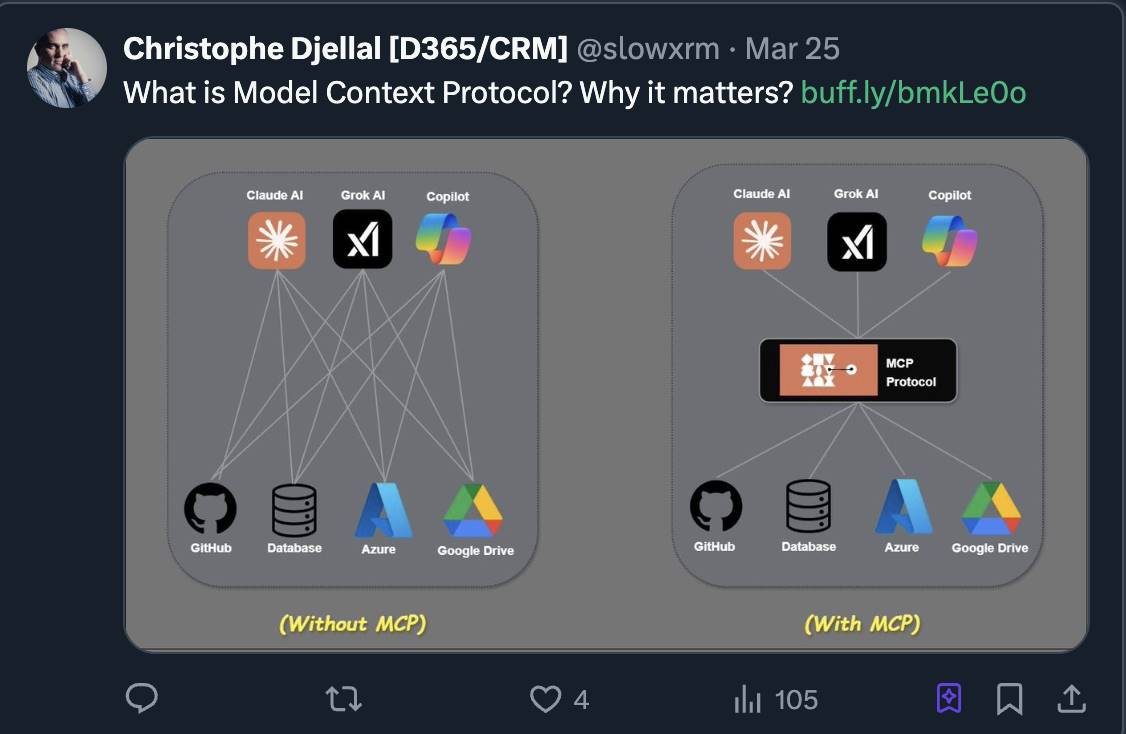
开源协作:MCP的开源特性促进了整个行业的协作,这与集中化AI公司的孤立方法形成鲜明对比。 这是加密领域的一个重大价值主张。
以下是一个快速对比:

一些高层次的例子展示了MCP在加密领域的潜在应用:
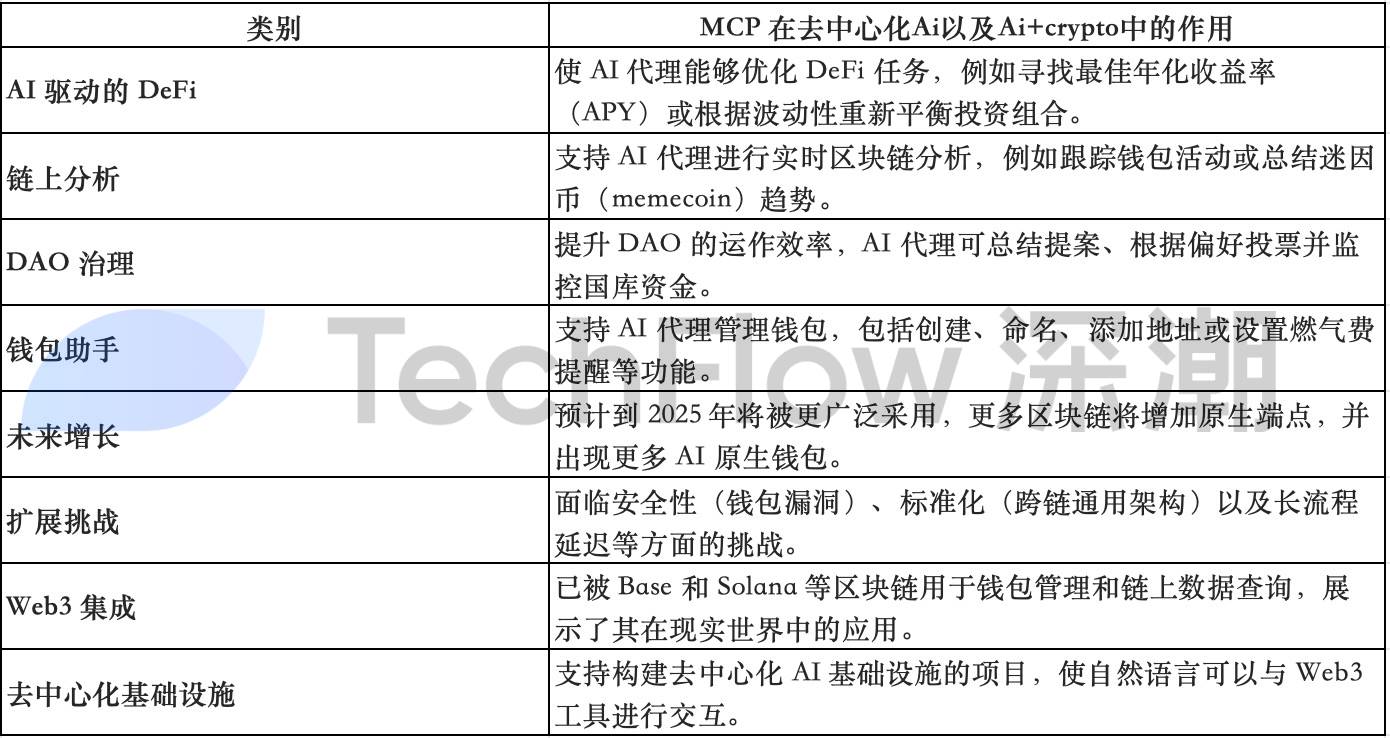
我们已经开始看到一些推动,例如:
-
DeFAI(去中心化金融与AI的结合)解决方案,例如@danielesesta 的@heyanonai、@LimitusIntel或@gizatechxyz;
-
针对链上分析的定制工具,例如@aixbt_agent。
随着MCP在更广泛的加密和AI生态系统中的进一步集成,未来将会有更多创新出现!
7)结论
MCP代表了迈向代理型AI未来的重要一步。在这一未来中,自主系统能够与周围的世界无缝交互。
通过为AI代理连接外部数据源提供一个标准化框架,MCP解决了AI开发中的关键瓶颈,使得解决方案更加智能、适应性更强且具备更高的可扩展性。
整个行业对类似MCP协议的接受与支持,表明了朝着代理型愿景共同努力的趋势。
然而,仍然存在一些挑战:
MCP及其类似框架的成功将取决于广泛的采用、协议之间的互操作性,以及与快速发展的AI环境保持同步的能力。
随着我们迈向一个AI代理在生活中扮演越来越重要角色的未来,像MCP这样的框架将成为连接AI与现实世界应用的重要桥梁。
无论MCP最终成为事实上的行业标准,还是仅仅作为进一步创新的催化剂,它已经引发了一场关于代理型AI和代理型加密产品所需基础设施的关键讨论。
免责声明:本文内容仅供信息和教育用途,不应被视为投资或财务建议。作者未持有文中提及协议的任何财务权益。
免责声明:本文章仅代表作者个人观点,不代表本平台的立场和观点。本文章仅供信息分享,不构成对任何人的任何投资建议。用户与作者之间的任何争议,与本平台无关。如网页中刊载的文章或图片涉及侵权,请提供相关的权利证明和身份证明发送邮件到support@aicoin.com,本平台相关工作人员将会进行核查。



